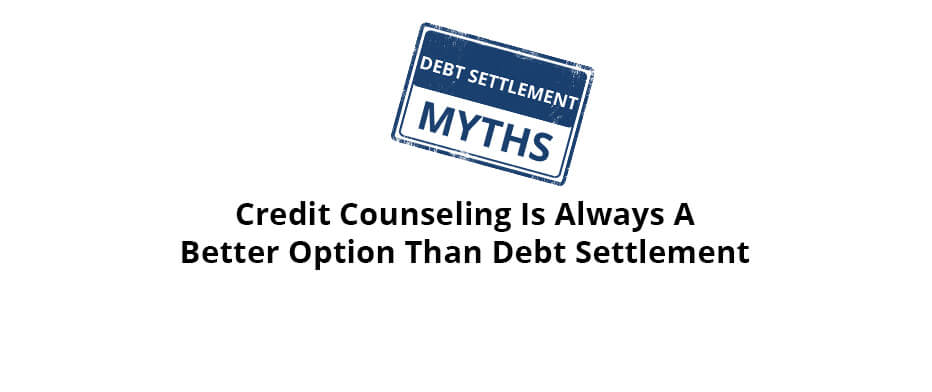Myth: Credit Counseling is Always a Better Option than Debt Settlement


Key Takeaways
- Credit counselingrequires you to repay the full balance owed within five years.
- Consumers with financial hardship who cannot meet this aggressive repayment schedule could benefit more from debt settlement.
- All debt relief options have a negative, but temporary impact on your credit.
Reality: Credit counseling might be the best debt relief option if you can pay your account’s full balance within five years. On the other hand, debt settlement allows borrowers facing financial hardship the option to pay less than the total balance, eliminating debts in two to four years.
Credit counseling and debt settlement have several commonalities, making each a valuable debt relief option if you meet the criteria. Both assist with debt elimination and repay creditors on your behalf, allowing you to make a single monthly payment to the agency. Credit counseling saves you money through waived interest and fees, where debt settlement assumes the full balance when calculating a discounted payoff.
How Do Credit Counseling and Debt Settlement Programs Work?
Credit counseling agencies offer debt relief through a debt management program or DMP. You enroll unsecured debts like credit card bills into the program,and then creditors will approve a repayment schedule that will last no more than five years. The agency maintains relationships with creditors, who supplement their income, preventing them from being a non-biased partner on your debt elimination journey.
Debt settlement helps consumers facing financial hardship that prevents them from repaying debts in full. Once enrolled, you stop making payments to creditors and redirect some of those funds into a program savings account. Growing savings balances provide the funds needed to pay off the account once a settlement is reached. You approve the agreement, and the debt settlement company makes the payments based on the new contract, fulfilling your legal obligation to repay the debt.
What Debts Can You Include in Credit Counseling and Debt Settlement?
Credit counseling and debt settlement only accept unsecured debts or bills without collateral. Common accounts include credit card bills, personal loans, medical debts, payday loans, and past-due utilities
How Will Credit Counseling and Debt Settlement Impact Your Credit?
Both debt relief options will temporarily damage your credit. As you begin to pay off debt, your credit score will recover. Making on-time payments to open accounts and paying off delinquent creditors, even if for less than the full amount owed, will help your score increase.
How Long Will It Take to Pay Off Your Debts?
The DMP managed through credit counseling requires you to repay 100% of the balance owed within 60 months or five years.
Debt settlement programs do not have a maximum time frame for program completion. However, if you make the recommended monthly contributions, you should eliminate all enrolled debt within 48 months and sometimes can complete the program in as little as two years.
How Much Will You Pay Out of Pocket to Eliminate Your Debt?
Credit counseling programs require full repayment, but will save you money through waived interest and fees.
Debt settlement bases the payoff on the full balance. However, a debt settlement company can negotiate a discounted payoff ranging from 20% to 80% of the amount originally owed.
What Happens If You Don’t Complete the Program?
Credit counseling negotiates concessions with creditors. Failing to finish your DMP will result in the cancellation of these discounts, adding waived interest and late fees to the account balance, canceling any benefit from being in the program.
In debt settlement, you deposit funds into an FDIC insured Program Savings Account. Leaving the program early will stop any debt settlement activity and could result in you paying the full amount owed plus interest and penalties.
Final Thoughts
Both programs offer debt relief to overextended consumers. The inability to keep accounts current could indicate that debt settlement is the best option. Where the ability to repay creditors in full could align with credit counseling.
FAQ

REPRESENTATIVE EXAMPLE OF APR
If you borrow $30,000 over a term of 5 years (60 months) with an APR of 4.99% you will pay $566.00 each month. The total amount payable will be $33,959.97, with total interest of $3,959.97.
ANNUAL PERCENTAGE RATE (APR)
Annual Percentage Rate (APR) represents the annualized interest rate you are charged for borrowing. It is the combination of the nominal interest rate and some additional costs such as fees involved when incurring debt. Our lender offers APRs for personal loans, cash advance loans, installment loans and debt consolidation loans from 4.99% to 35.99%. Since New Start Capital does not directly issue loans, we cannot deliver any specifics or guarantee the APR you will be offered. The APR depends solely on your lender’s decision, based on various factors including your credit score, credit history, income, and some other information you supply in your request. For more information regarding the APR contact your lender.